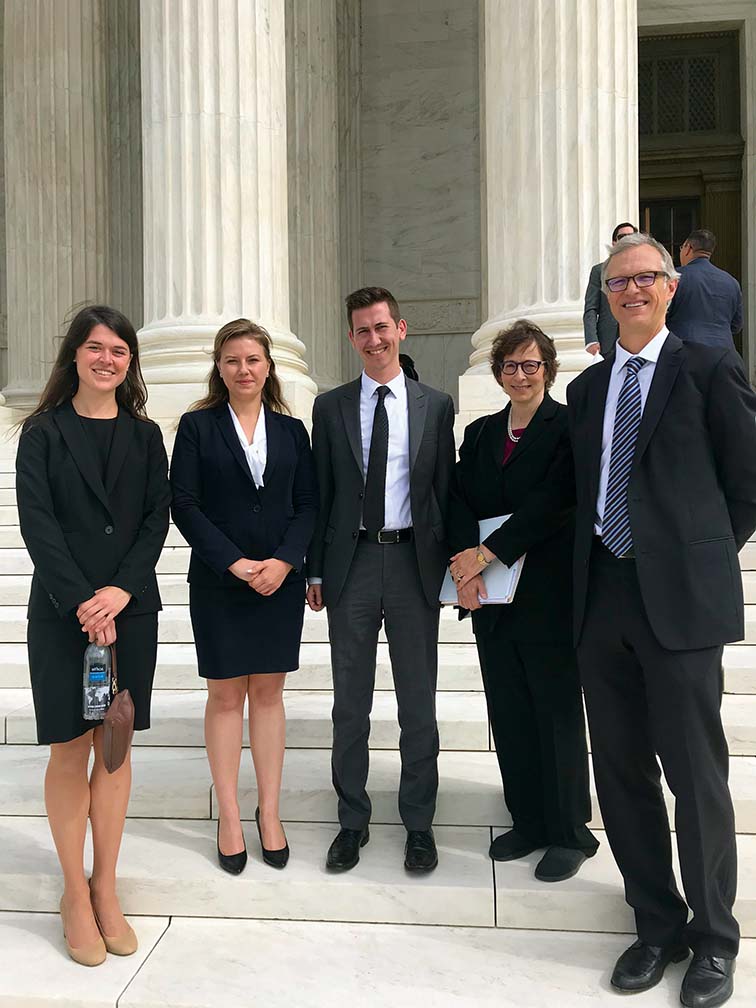Is a Nonunanimous Jury Verdict Constitutional?
For nearly a century, Louisiana and Oregon have shared an outlier trait: Both allow juries to convict criminal defendants by nonunanimous verdict, even when a life sentence is at stake. Under Louisiana’s law, Evangelisto Ramos was convicted of second-degree murder after a brief trial, despite the fact that two jurors dissented from the guilty verdict. Mr. Ramos challenged his conviction, arguing Louisiana’s nonunanimous jury law violated his Sixth Amendment right to trial by jury. And on October 7, 2019, the U.S. Supreme Court heard arguments in his case, Ramos v. Louisiana. Professor Jeffrey Fisher, co-director of Stanford Law’s Supreme Court Litigation Clinic (SCLC) and a leading Supreme Court advocate, argued the case on behalf of Mr. Ramos.
As students in SCLC in spring 2019, we had the opportunity to work with Professor Fisher in representing Mr. Ramos. After the Supreme Court granted certiorari in April 2019, our co-counsel, G. Ben Cohen of The Promise of Justice Initiative in New Orleans, invited the clinic into the fight. We began our work with a trip to Angola State Prison outside New Orleans to visit Mr. Ramos. That week, the stakes of our work fully sank in. We met the team that had represented him throughout the lower court proceedings, and we spoke to Mr. Ramos for several hours. The faith and trust of the team in New Orleans was inspiring and immensely humbling. And Mr. Ramos, whose challenge to his incarceration hinged on our efforts, told us warmly, “Don’t worry. Everything is going to be fine.”

Eager to prove him right, we returned to Stanford with fresh motivation to make the case against Louisiana’s law. Under the guidance of Professor Fisher and our co-counsel, and with the help of the other students and instructors in the clinic, we researched and drafted the opening merits brief. We began by researching the history of unanimity in the common-law system. We learned that the unanimity requirement first became the common-law norm in medieval England and was still the norm when the Sixth Amendment to the U.S. Constitution was ratified. We also discovered numerous studies demonstrating that nonunanimous juries deliberate less, tend to be more error-prone, silence minority voices, and instill less confidence in the justness of verdicts in the public. Armed with these historical and empirical arguments, we mounted a case against nonunanimity laws that strove to appeal to perspectives across the ideological spectrum. Through multiple rounds of outlining, drafting, and feedback, Professor Fisher used his extensive experience and strategic insights to help us shape these arguments into a coherent narrative. In October, we had the opportunity to travel to Washington, D.C., to watch our brief come to life as Professor Fisher argued the case before the justices.
Our trip to view the oral argument—and the size and enthusiasm of the coalition that had come from Louisiana to hear the argument—reinforced the fact that our role in this case was a short part of a long story. Louisiana’s nonunanimous jury provision has been in the state’s constitution since 1898 and, like Oregon’s, it has deeply racist and xenophobic origins. Prior to 1898, every state in the union had required juries to reach unanimous consent in order to convict a defendant of a felony. Anything less resulted in a mistrial. But as the Supreme Court began enforcing the protections of the Fourteenth Amendment following Reconstruction, Louisianans grew concerned about the increasing political power of African Americans. In 1898, Louisiana held a constitutional convention with the express intention of “assur[ing] white political supremacy” in the state. Louisiana’s new constitution erected numerous roadblocks to black suffrage, including the infamous Grandfather Clause, poll taxes, and literacy and property qualifications for voting, as well as the nonunanimous jury provision, enabling white majorities to outvote black minorities in the jury box. Oregon’s nonunanimity law was adopted under similarly ignominious circumstances. Roiled by a rising tide of nativism and the ascendance of the Ku Klux Klan, Oregon adopted its nonunanimity law in the 1930s in response to a wave of immigration and fierce public outcry after a Jewish man accused of murdering a local Protestant was convicted of only manslaughter, rather than murder, because one juror dissented.
Despite these laws’ sordid pasts, discriminatory effects, and extreme outlier status, they received the Supreme Court’s ostensible approval in 1972. In Apodaca v. Oregon, the Court held that, although the Sixth Amendment’s Jury Trial Clause requires unanimous convictions in federal trials, that guarantee does not extend to state criminal trials. Despite that ruling, a few committed Louisiana advocates continued challenging the law in Louisiana courts and repeatedly petitioned the Supreme Court to reconsider Apodaca. G. Ben Cohen has been urging the Court to reconsider the issue for over a decade. Calvin Duncan, a former (and now exonerated) jailhouse lawyer who was recently profiled by the New York Times, helped countless inmates in Louisiana’s prison system preserve challenges to the nonunanimity scheme. And, in 2018, Louisiana’s largest daily newspaper, The Advocate, published a series of articles examining the effects of the state’s nonunanimity scheme through painstaking data analysis. The Pulitzer-Prize-winning series found, among other things, that black defendants are significantly more likely than white defendants to be convicted by nonunanimous verdicts.
Through the efforts of The Promise of Justice Initiative, the reporting from The Advocate, and help from many other organizations, this fight was brought to the ballot box. In 2018, Louisiana’s voters amended the state constitution to require unanimous jury verdicts for crimes committed after January 1, 2019.
Still, at least for now, Louisiana’s prosecutors remain fully entitled to seek convictions by 10-2 verdicts for crimes committed before 2019. And countless people currently incarcerated in both Louisiana, and Oregon, were convicted by nonunanimous juries. Hopefully, the Supreme Court’s pending ruling in Ramos v. Louisiana will change that. While the Court will not issue a decision for several months, it was the honor of a lifetime to have been included in this fight for justice. SL
